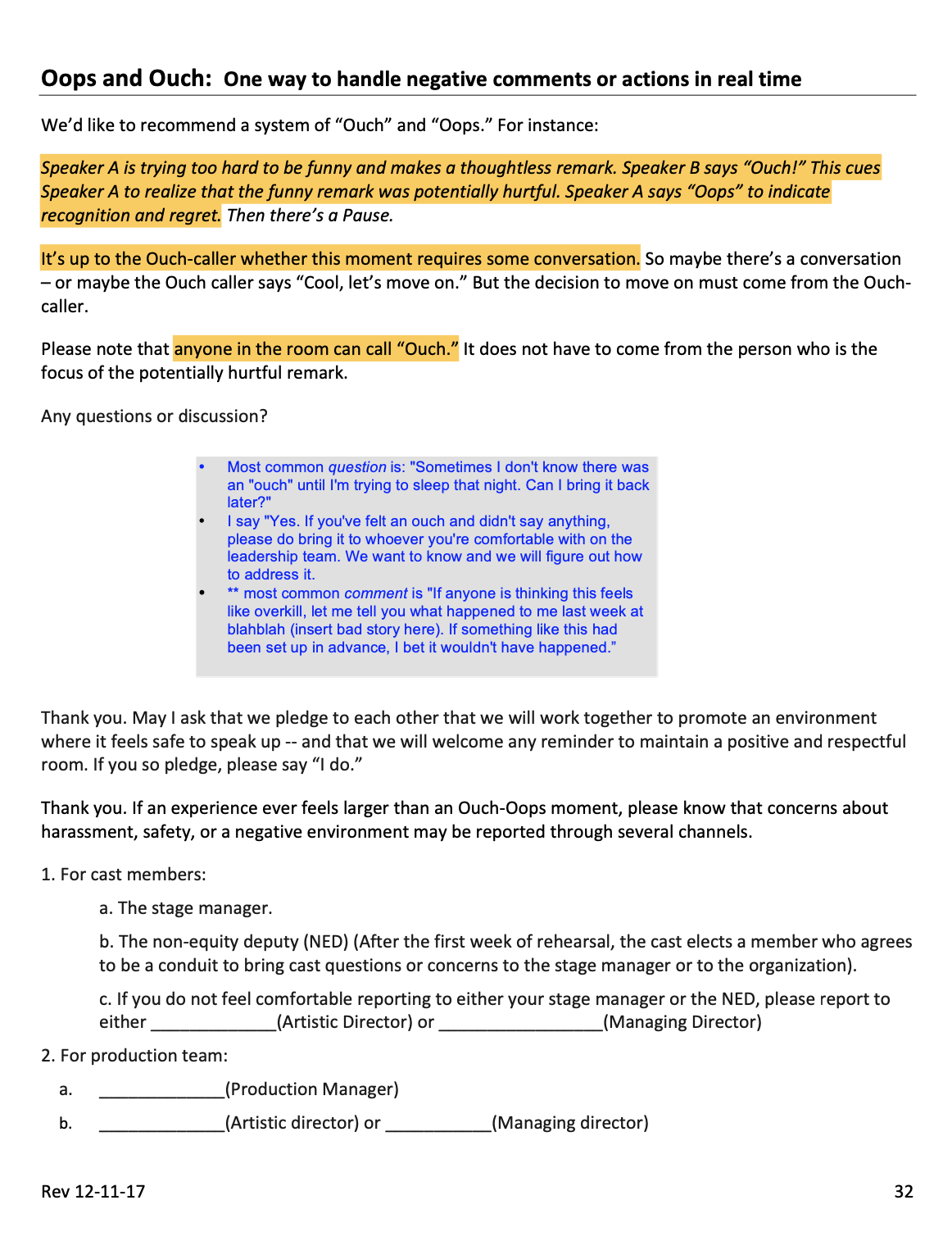Oops and Ouch - A Possible Tool for Combating Racial Tension
Brianne Jackson is a brilliant and inspiring black woman I met in FSU’s School of Theatre. Here we discuss a tool to create more safety for People of Color in the theatrical workspace.
Brianne : I experience microaggressions and racism in the theatre community. I have literally told fellow actors “you can’t say the n-word.” And still, try not to come off as aggressive and unapproachable. (In reality, there is nothing cool or calm about using racial slurs).
Some were more subtle than that. Once, I was told by my white, female director that a schoolgirl costume worn on a white girl with the same body type became promiscuous once I put it on. All I could do was smile so as not to come off as a difficult black woman and a difficult actor.
Neither environment promotes effective communication when you are hurt by someone’s words or actions. I have felt like it is me against everyone in every rehearsal space I have been.
Ali : My shtick is creating a safer environment for theatre artists so contact can be conducted “freely.” I can’t imagine how much more complicated it would be for POC. Have you heard about the “Oops and Ouch” system in The Chicago Theatre Standards? It’s a tool to help make the workplace safer. Here is a screenshot of the system:
[TLDR; It is an approach for expressing feelings of discomfort in real-time that is easy and does not disrupt the flow of a conversation while allowing for discussion and honesty.]
With this system, you could have said the word “Ouch” when your director made that comment about the costume to make your feelings known. She would have the option of responding “Oops” to acknowledge and apologize for whatever might have offended you (whether she is aware of it or not). This exchange is quick and allows the conversation about costuming to continue. However, it also bookmarks racially insensitive comments for further discussion at another time if necessary.
The CTS and Oops/Ouch were created in response to sexual harassment in the workplace. I feel like it could be used to address racial tension as well.
What do you think?
Brianne : An important part of what the Chicago Theatre Standards have created with Oops/ Ouch is a safe environment for conversation. As a black woman, the first thought I had was how can I use this system to address racist and unconsciously biased comments. It’s a shame I have not felt comfortable or validated enough to share my pain in the rehearsal room. Many times, I held my tongue to not “disturb the progression” of the work. I had to decide if a comment was worth making. Could I lose the footing I barely have in this industry?
I think Oops/Ouch is one step to address all mediums of harassment. It is an effective way to pause and be able to confront a moment instead of never taking the time to explain why comments are wrong or misguided.
However, the conversation should not end once you have communicated your “Ouch.” It must continue through educating and acknowledging things within yourself that block a more positive rehearsal space. Oops/Ouch is a tremendous start to changing dialogue and mindsets not only in the rehearsal space but in classrooms, dressing rooms, production meetings, etc.
Ali : I can’t believe how much you’ve had to pick your battles. I can imagine how much energy you spend feeling frustrated by ignorance when you’d rather spend it on the theatrical work.
I seem to say the wrong thing when I get nervous or insecure. I know if I misstepped, I would appreciate feedback. I’d like to think we all want to grow and change and be better.
Sometimes being called out on something offensive, sparks a conversation that is life-changing. There is something so tangible, so personal and so embarrassing about these conversations. Especially between two people of different races. And if a person witnesses offensive behavior, Oops/Ouch makes room for these difficult conversations. Conversations that I would find important. Maybe even therapeutic... Is therapeutic even an appropriate word?
Brianne : I think it's a good word... Black people have always been taught to deal with problems on our own because the world isn’t designed for us to have help. However, by implementing the therapeutic aspect of having such tough conversations through the Oops/Ouch system is important. We need healing.
Ali : Would you feel comfortable using this Oops/Ouch System? What other factors go into you feeling safe to speak up despite the complicated power dynamics of a theatrical environment?
Brianne : I would 100% feel comfortable. As long as those who are applying the Oops/Ouch System implement a safe environment as well as open dialogue, I wouldn’t have a problem.
There are so many things to be done that contribute to having a safe environment. It needs to start with personal exploration and education. Specifically, within that theatrical environment, I think it is so important to see others who look like me. It’s reassuring that someone who truly understands my blackness is in the room advocating with me. Most importantly, not only are those people seen, they are heard.
